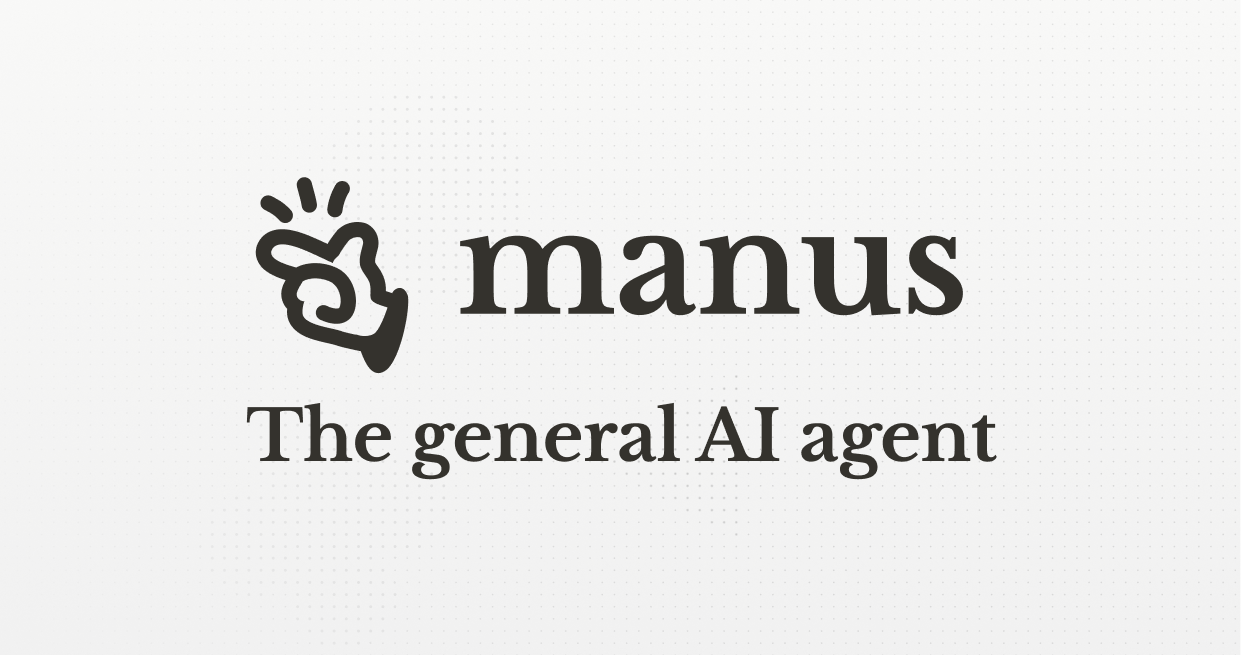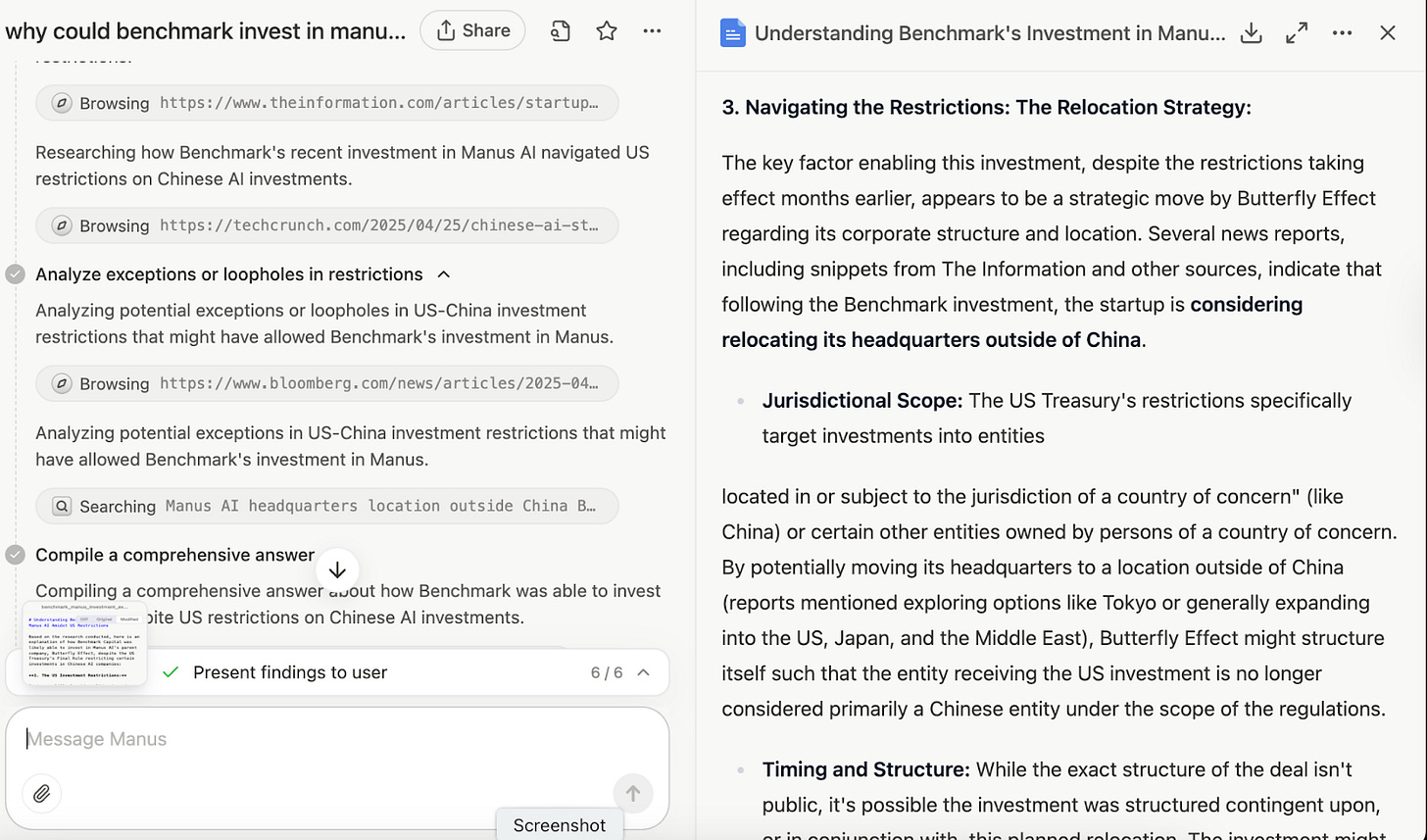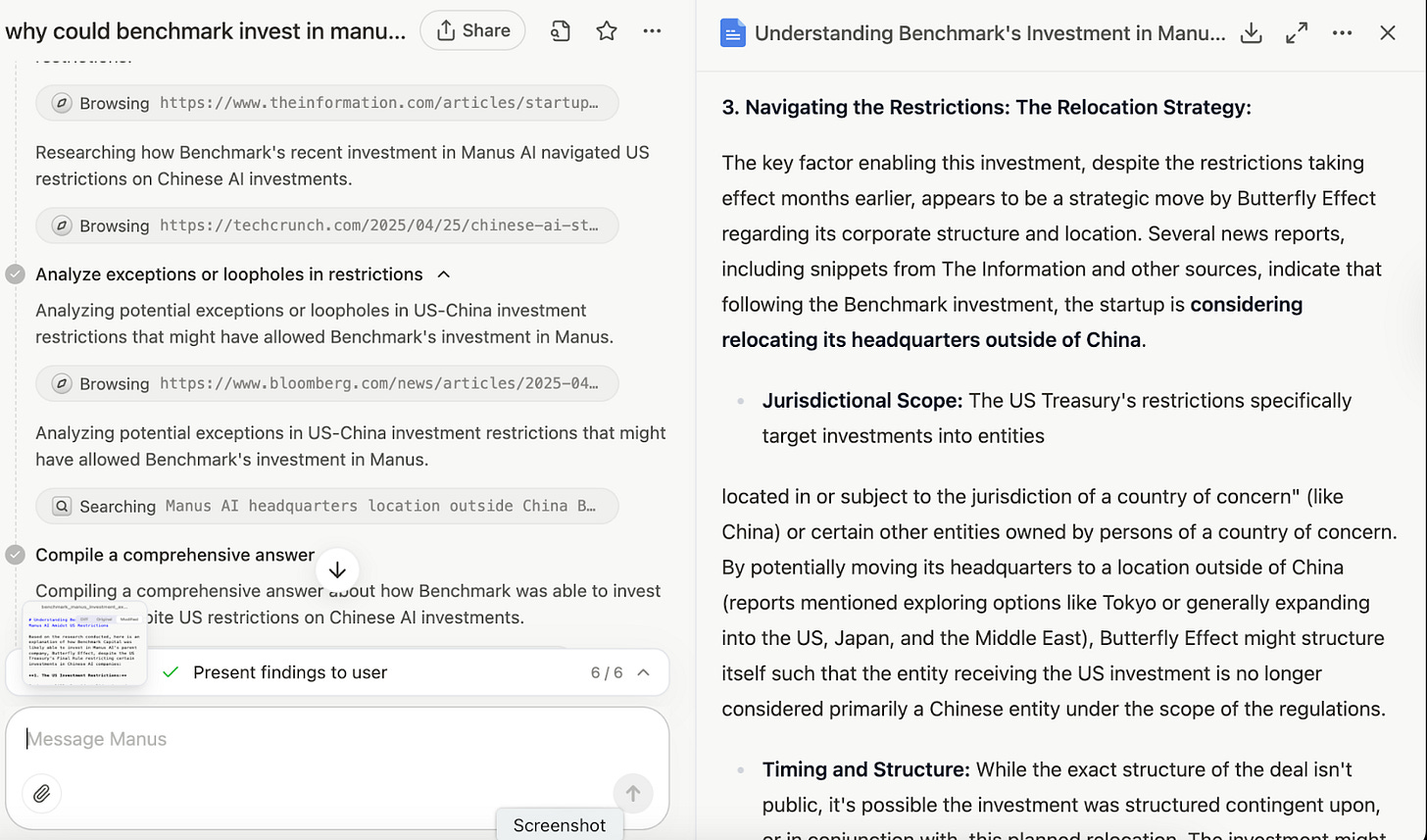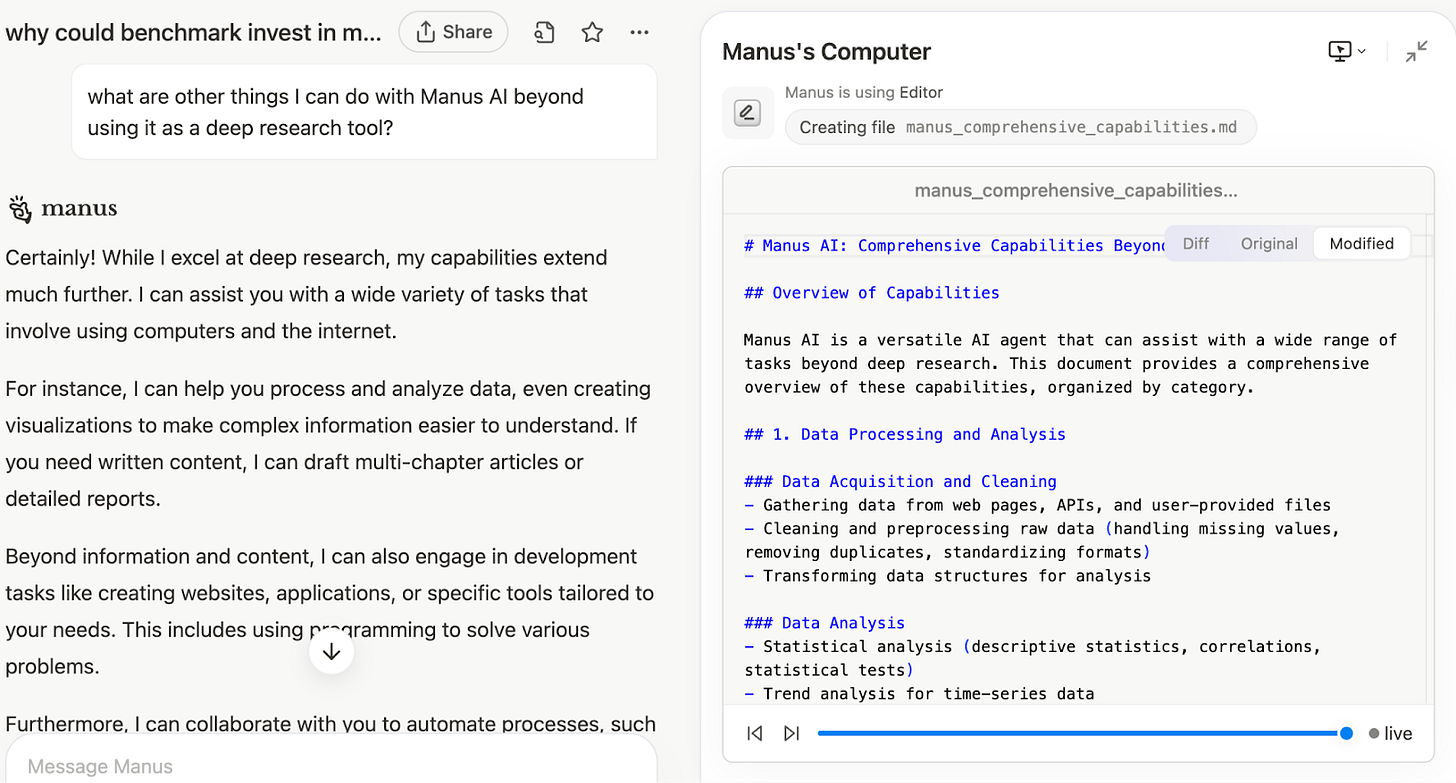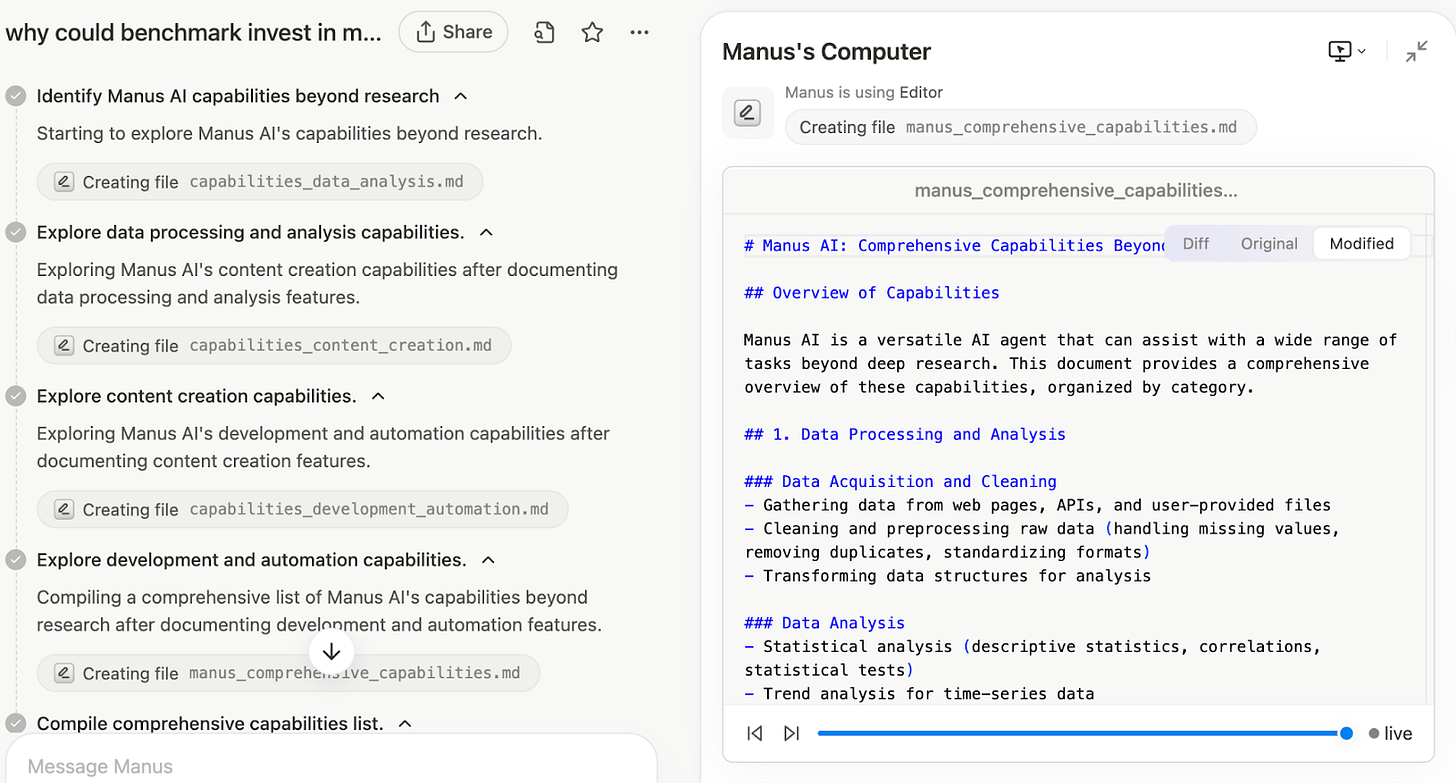Benchmark's First China AI Investment & I Finally Tried out Manus AI
Benchmark Capital led the latest investment round on AI agent, Manus AI
Hi all,
Chinese AI startup Manus reportedly secures funding from Benchmark at a $500M valuation, and it's reportedly Benchmark’s first “China-China” deal.
I actually heard about this deal last week from an industry source, and it’s definitely boosting some confidence within the space in China. The latest funding led by Benchmark Capital is valued at ~$75 million in a funding round led by Benchmark at a roughly $500 million valuation, according to Bloomberg.
Some of you may ask why Benchmark is allowed to invest in Manus AI. As many of you know, a rule that went into effect in January this year prohibited U.S. investors from investing in Chinese semiconductors, quantum computing, and AI. (which low-key led to some scares across China-based U.S. nationals/ investors and institutions)
So I was curious why Benchmark was able to complete this deal. Now, an explanation on this:
The rules prohibit or restrict U.S. investments in Chinese companies engaged in certain activities related to semiconductors, quantum computing, and AI systems that have military, surveillance, or other national security implications (you can read more in the link above to the law firm’s detailed explanation).
This actually explains why China’s internet players all have HUGE U.S. investor ownership - think Tencent, Alibaba, ByteDance, etc., whereas the AI companies do not. [FYI, Patrick O’Shaughnessy’s episode with Matt Huang was quite good and talked about how Huang got into ByteDance really early on]
According to an investor in the space, Manus received the capital in its offshore entity for non-China development. That’s also likely why this investment went smoothly forward. The Manus privacy page shows that the details were last updated just a few days ago in April. BUTTERFLY EFFECT PTE. LTD was mentioned as the parent company, instead of monica.ai as previously reported.
With this precedent, more and more U.S. VC/PE will likely try to enter this space with a few maneuvers or tweaks to the investee’s HQ/ ownership structure.
However, the prohibitions are narrowly defined and do not blanket-ban all AI investments. Many commercial AI applications, especially those not directly linked to military or surveillance uses, may still be permissible or subject only to notification requirements rather than outright bans. In the case of Manus AI, the AI agent is entirely for commercial use.
According to Manus AI’s own research on this topic, Benchmark was able to invest in Manus because of its intentions of moving its HQ out of China, despite announcements of partnerships with Alibaba’s Qwen. [See this link for more context on the background of Manus AI]
But the explanation offered by Manus itself said: “In summary, Benchmark's investment in Manus AI's parent company, occurring after the US restrictions came into effect, was likely made possible by the startup's strategic consideration to relocate its headquarters outside of China. This move potentially places the relevant corporate entity outside the direct jurisdictional scope of the US Treasury's Final Rule, allowing the US venture capital firm to invest while navigating the complex geopolitical and regulatory landscape surrounding US-China technology investments.”
In addition, according to reports, the company will use the money to expand to new markets, including the U.S., Japan, and the Middle East, Bloomberg noted, citing people familiar with the matter.
Previously, Manus’ investors have been mainly from domestic backers such as Tencent and Hongshan (Sequioa’s China spin-off). Despite receiving high praise from the likes of Twitter founder Jack Dorsey, calling it “excellent,” the Information and TechCrunch both said they did not think it was as good as it was hyped.
Now, I finally got my invite to try it out, and played around with it for various research topics. My sense is it is not that different from OpenAI’s DeepResearch for research purposes, and maybe I’m not using it to its best capacity. The overall reasoning “thinking” speed (~1.5 -2 min for a relatively easy question) does seem like it lags behind OpenAI for the same kind of tasks. Still, the results are pretty comprehensive and impressive. I definitely will keep using it for cross-checking research, and to get a primer research done on new topics I’m not familiar with, but not for simple tasks (seems like a waste of time/ compute power).
What’s the difference between an AI Agent vs. an AI chatbot?
On the surface, the interface or usage of AI agents or chatbots may still not look that different. Although there has not been a standardized definition of an agent, a few factors define the difference. There are more nuances to this, and some chatbots are becoming more advanced, but a high-level breakdown looks like this:
Functionality and Complexity
Chatbots are designed to engage in Q&A-style interactions. Mostly providing quick answers to questions or providing users with a predefined workflow. Conversations are usually simple, repetitive, and structured in their interactions, but they cannot complete multi-step tasks in a streamlined way.
Agents handle complex, multi-step, and multi-faceted tasks that may span platforms and services, such as booking plane tickets or making reservations for the user. They can break down more complex tasks into steps, as you can see in the screenshots above, how Manus thought through how to answer the questions. They can orchestrate workflows and execute actions autonomously in the background, and completing the tasks usually takes longer.
Autonomy
Chatbots typically operate on a pre-trained rule-based system, keyword matching, or decision trees, that follow predefined scripts. Reasoning was only introduced later.
Agents are said to have autonomous decision-making capabilities and can adapt to new information in real-time and solve problems independently without human intervention. It can initiate actions without prompting such as help monitor email inbox or flag important news.
Memory and Planning
Chatbots often have limited memory (if any) of prior conversations. They are mostly reactive, responding based on the current input and limited to what they know in the existing chatbox.
Agents usually have long-term memory, task management, and planning capabilities. They can handle multi-step goals (e.g., book a flight, reserve a hotel, send a follow-up email) and adjust their behavior if something changes.
Tools & APIs
Chatbots are usually limited to the webpage or the phone interface.
Agents can use external tools such as APIs, databases, webscraping, file systems, CRMs, etc. They can gather new information or find tools they need to complete a task (much more like how a human would go about solving a problem).
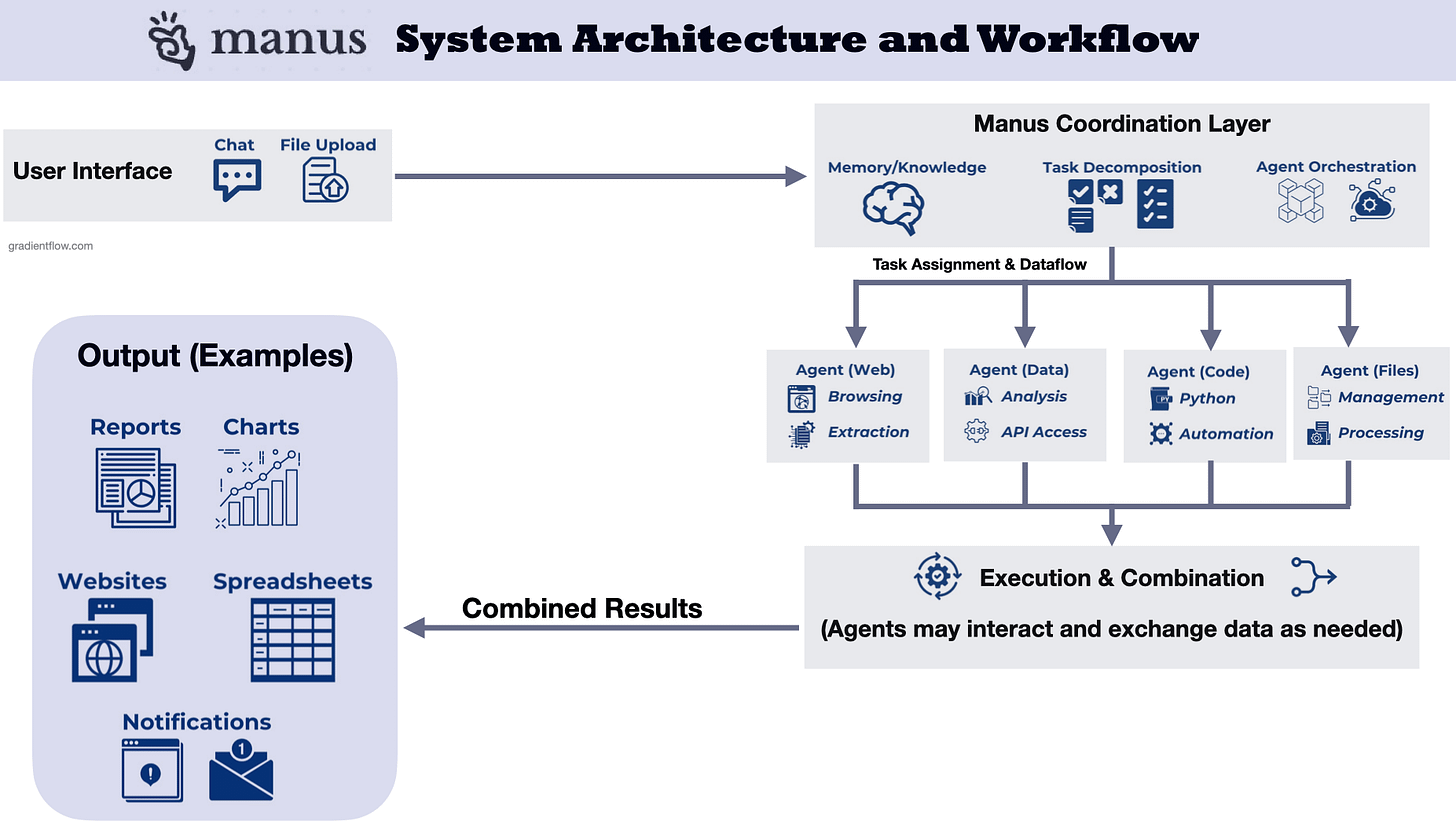
Source: Gradient Flow
And to better understand what a general AI agent can do, I asked “the best agent out there right now” - Manus itself, what else I could use it for besides deep research tasks, and it told me:
Data Processing and Analysis: I can help you gather, clean, analyze, and visualize data from various sources, creating meaningful insights and reports.
Content Creation: I can assist with writing long-form content, including multi-chapter articles, technical documentation, and comprehensive guides. I can also summarize information and format content according to your needs.
Development and Automation: I can build websites and web applications, develop custom tools and scripts, and automate processes like form-filling and data collection across websites.
Collaborative Problem-Solving: I can break down complex problems, suggest alternative approaches, and adapt to changing requirements as we work together.
Must listen/ watch this week
By the way, I highly recommend listening to this BG2 episode. I find Bill Gurley’s (former Benchmark partner) take very fair and balanced. He said that there is an oversupply of commentaries in the U.S. that are advocating to “win at AI,” but he doesn’t even know what that means, given that some say one party reaches AGI first, then what? He also talked about containing China’s AI development through export bans, which has seemed to be counterintuitive, and how the “arms race” really is more about humanity vs. technology and not China vs. the U.S. [I filed a op-ed for Fortune last week that largely aligns with this view, will share when pubbed]
He highlights that there will be so much progress and potentially more risk, especially as we’re still in the technology’s infancy stage. It’s refreshing to hear from someone who is thinking about this pragmatically and stepping back from all the geopolitical noise. He emphasizes that it’s better to be collaborative than not. Knowledge, research, capital, and talent have been so intertwined that a decoupling isn’t going to be possible, nor is it productive for anyone. Please do give it a listen.


